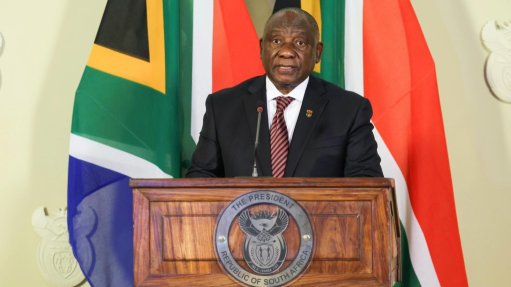Final rest for Sam Nujoma
He was the last man standing among Southern Africa’s liberation heroes – those who fought for independence and became founding leaders of their nations. Samuel Shafiishuna Daniel Nujoma, a towering figure in his nation’s history, breathed his last on February 8, aged 95.
Known to many simply as Sam Nujoma, he led the South West Africa People’s Organisation as it waged a bitter armed struggle for Namibia’s freedom from apartheid South Africa from 1960 until independence in 1990. He then stayed at the party’s helm until 2007, two years after he had stepped down as State President, following a 15-year tenure.
Nujoma was cut from the same cloth as liberation-heroes-turned-founding-fathers Nelson Mandela and Julius Nyerere, who relinquished power voluntarily – unlike fellows like Zimbabwe’s Robert Mugabe, who was removed in a coup those behind it cleverly branded as a “military-assisted transition”, or Kenneth Kaunda, who clung on to the top job until fed-up Zambians voted him out after many years of one-party rule. Kamuzu Banda, the former medical doctor who governed Malawi with an iron fist from 1964 to 1994, also faced the shame of a career-ending electoral defeat.
Of the other founding fathers in our neck of the woods, Mozambique’s Samora Machel perished in that ill-fated plane crash on South African soil in 1986 and Angola’s Agostinho Neto succumbed to cancer in 1979, just four years after independence. Like Neto, Botswana’s Seretse Khama also died of cancer while serving as President, but his tenure was much longer – from 1966 to 1980.
Nujoma will be remembered not only for dedicating a big chunk of his life to Namibia’s struggle for freedom but also for being a champion of reconciliation in a country scarred by the legacies of apartheid and German colonialism under the motto ‘One Namibia, One Nation’. In public speeches, he often repeated the mantra: “A united people, striving to achieve a common good for all members of society, will always emerge victorious.”
Nujoma is also credited with establishing democratic institutions in Namibia during his Presidency.
Not many of those who penned his obituary in the hours and days following his demise mentioned something Namibians should really give him credit for: while in rhetoric he backed the land seizures of Mugabe, his kindred spirit in Zimbabwe, he refrained from implementing a similar policy at home, opting instead for a ‘willing buyer, willing seller’ approach.
We now know the devastation that Mugabe-style land redistribution has caused in Zimbabwe: an agriculture sector that is a shadow of its former self, employing only a fraction of its previous workforce and unable to help the nation maintain its status as a net exporter of many agricultural products.
Of course, like all of us, Nujoma was not flawless. What easily comes to mind are autocratic tendencies that surfaced once in a while and were on display in his brutal suppression of the Caprivi rebellion in 1999. There were also times when he was not exactly a friend of an independent media that does not shy away from playing its role as the watchdog of society. A prime example of this was his 2001 decision to ban government departments and agencies from placing advertisements in the privately owned The Namibian newspaper, accusing it of pursuing an anti-government agenda.
That said, it can be argued that, as State President, Nujoma was a lot better than many national leaders we have on the continent today. Just look at how difficult it has been for the Mo Ibrahim Foundation to find worthy recipients of its multimillion-dollar bonsela for former leaders who distinguished themselves while in office. The last recipient was former Nigerien President Mahamadou Issoufou in 2020. Previous winners were Liberia’s Ellen Johnson Sirleaf in 2017, Nujoma’s successor – Hifikepunye Pohamba – in 2014, Carbo Verde’s Pedro De Verona Rodrigues Pires in 2011, Botswana’s Festus Mogae in 2008 and Mozambique’s Joachim Chissano in 2007, the same year Mandela was named an honorary laureate.
In the end, Nujoma’s legacy as a leader who steered Namibia to independence and championed unity will outshine the imperfections of his rule.
Article Enquiry
Email Article
Save Article
Feedback
To advertise email advertising@creamermedia.co.za or click here
Announcements
What's On
Subscribe to improve your user experience...
Option 1 (equivalent of R125 a month):
Receive a weekly copy of Creamer Media's Engineering News & Mining Weekly magazine
(print copy for those in South Africa and e-magazine for those outside of South Africa)
Receive daily email newsletters
Access to full search results
Access archive of magazine back copies
Access to Projects in Progress
Access to ONE Research Report of your choice in PDF format
Option 2 (equivalent of R375 a month):
All benefits from Option 1
PLUS
Access to Creamer Media's Research Channel Africa for ALL Research Reports, in PDF format, on various industrial and mining sectors
including Electricity; Water; Energy Transition; Hydrogen; Roads, Rail and Ports; Coal; Gold; Platinum; Battery Metals; etc.
Already a subscriber?
Forgotten your password?
Receive weekly copy of Creamer Media's Engineering News & Mining Weekly magazine (print copy for those in South Africa and e-magazine for those outside of South Africa)
➕
Recieve daily email newsletters
➕
Access to full search results
➕
Access archive of magazine back copies
➕
Access to Projects in Progress
➕
Access to ONE Research Report of your choice in PDF format
RESEARCH CHANNEL AFRICA
R4500 (equivalent of R375 a month)
SUBSCRIBEAll benefits from Option 1
➕
Access to Creamer Media's Research Channel Africa for ALL Research Reports on various industrial and mining sectors, in PDF format, including on:
Electricity
➕
Water
➕
Energy Transition
➕
Hydrogen
➕
Roads, Rail and Ports
➕
Coal
➕
Gold
➕
Platinum
➕
Battery Metals
➕
etc.
Receive all benefits from Option 1 or Option 2 delivered to numerous people at your company
➕
Multiple User names and Passwords for simultaneous log-ins
➕
Intranet integration access to all in your organisation

















